Special Feature
What's on Your Plate Today?
Hana Shams Ahmed
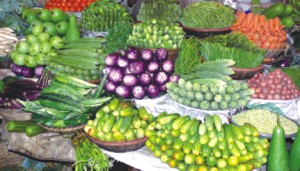 |
Much of the fresh look of vegetables that attract customers can be attributed to synthetic dyes and steroids. (Photo: Tasrif Jafar Siddique) |
Sumaira Rahman is a 35-year-old bookstore owner and a mother of two. Her daughter Samira and son Asif study in a private school in Dhanmondi. Sumaira lives with her husband, Arafat Rahman, a graphic designer and two children in Sobhanbag.
Before going off to her bookstore Sumaira makes sure that her family is well fed and no one goes off to their respective work without a full stomach. Her dining table is full of a wide variety of food all throughout the day. Sumaira tries to stick to the food pyramid as much as she can with as close a balance of fruits, vegetables, meat, fish and fibre. But little does she know that some other things have also crept silently into her carefully-planned pyramid.
Samira likes to have honey on her bread first thing in the morning, which her mother thinks is a very healthy choice. But the honey eight-year-old Samira likes to eat is not the pure honey her mother would like to think she is having. Sugar syrup has been mixed with this honey to enhance the sweetness. The milk six-year-old Asif is having with his favourite breakfast cereal is also not free from adulteration. It also did not have a manufacturing or expiry date but the shopkeeper who was well-known to the family had assured Sumaira that it was fresh. She had also overlooked the fact that the bottle did not have a seal of approval from BSTI (Bangladesh Standards and Testing Institution). A research by Bangladesh Council of Scientific and Industrial Research (BCSIR) recently found out that all of the pasteurised milk and 86 percent of the powdered milk available in the markets are below the standard set by BSTI.
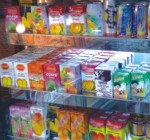 |
Most of the 'fruit juice' sold by local companies have no fruit
content at all. (Photo: Tasrif Jafar Siddique) |
Sumaira is not aware of this. She also sent her driver to Karwan Bazar early in the morning to get fresh bananas a ripe papaya that will provide her family with essential vitamins and minerals. But how much of these nutrients are there in these attractive-looking fruits? The bright yellow bananas have been sprayed with Calcium Carbide, an extremely hazardous chemical containing traces of arsenic and phosphorous, which the wholesalers obtain from places like Dhaka Medical College Hospital and Mitford Hospital. The papayas have also been treated in the same way. This not only gets rid of the essential nutrients but also makes the fruits extremely poisonous. Many fruits are also injected with dyes, synthetic colours and sweeteners to make them look fresh and draw more customers. Mangoes, jackfruit, lychees, watermelon and even pineapple are artificially ripened using a carcinogenic chemical called ethylene oxide.
And that's not all. The vermicelli on Arafat's plate, bought from the local marketplace was sold loose and did not have an expiry date. Even the so-called orange jelly of a popular local brand that Sumaira spreads on her bread has no traces of orange in them. The colour that was mixed with this jelly is not even a food colourant.
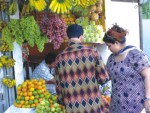 |
Fruits are sprayed with Calcium Carbide to prematurely ripen them.
(Photo: Tasrif Jafar Siddique) |
After everyone has left for their respective destinations, Sumaira sits down with her favourite cup of tea and pours a spoonful of condensed milk. Even this little cup of tea has been tampered with. The tea has been mixed with coloured sawdust and the packet she bought had some discarded tea combined with it. The condensed milk is only so by name. It has no traces of milk fat in it. It has been made with vegetable fat and powdered milk. According to the Bangladesh Atomic Energy commission the radioactivity levels in the powdered milk most of the popular brands of condensed milk import is much higher than the recommended limit.
Meanwhile, before dropping the kids off at school Arafat makes a stop at a confectionery shop on the way and buys two packets of mango juice for them. Unfortunately, the mango juice has virtually no 'mango' in it although it claims to be 'pure' and in fact has artificial colourings in it that doctors say can possibly cause cancer, kidney and liver failures, stomach troubles and potentially any kind of complicated diseases. Many juices claim in their advertisement taglines that they are very nutritious and healthy but these claims couldn't be further from the truth. Children love these juices for its high sugar content and many parents unknowingly give it to their children as a substitute for water when they refuse to drink that. Many of the country's most popular brands like Acme Orange Juice, Acme Mango Juice, Starship Orange Juice, Aarong Mango Juice, Pran Orange Juice, Top Mango Juice and Shezan Mango Juice did not meet the minimum standards set by BSTI according to a Daily Star report (July 27, 2005).
 |
Formalin, a toxic chemical, is rampantly used to make old, rotting fish look fresh. (Photo: Zahedul I Khan) |
Water too in fact is not always what it seems. In 2005 the Consumers Association of Bangladesh (CAB) revealed that seven mineral water brands, although qualified as drinking water, did not have the elements to qualify it to be called 'mineral water'.
Sumaira, in the meantime, comes home from her bookstore to oversee how the lunch preparations are going. Sumaira bought ten kilos of the brightest-looking Najir Shail rice from Karwan Bazar in the morning and a huge ruhi fish which are going into today's menu along with a mixed vegetable stir fry of tomatoes, cauliflower and potatoes. Sumaira was completely unaware of the fact that the chemical fertiliser urea was used in the rice to make it whiter and later polished with candle wax to give it an attractive glaze. Even a lot of red rice have artificial colours in it.
The fresh-looking ruhi fish that was bought from the market was actually imported from Myanmar through Teknaf quite a few days ago. The fresh look was obtained by applying formalin (formaldehyde, used for preserving dead bodies in medical schools), which can cause serious health hazards for consumers. According to a recent newspaper report at least 80,000 kilograms of formalin-treated fish daily enter the country from Myanmar.
To make life easier for her home workers, Sumaira purchases powdered spices from the market, which although makes cooking easier is unfortunately not free from the grip of dishonest businessmen. The chilli powder that is used to cook the fish has been mixed with brick dust. According to CAB fine sawdust and seeds of sour plum (boroi) are also sometimes used with cumin and other ground spices.
The tomatoes for the stir-fry before appearing in Sumaira's table were originally green in colour. To make them appear red and juicy they were injected with a toxic artificial dye. According to a newspaper report almost 80 percent of the organic produce including fruits and vegetables available at the market are contaminated with toxic substances. According to the Dhaka City Corporation (DCC) farmers use toxic pesticides containing Organo Chlorinate, Mercury, Lead, Organo Phosphate and numerous other hazardous poisons to ensure maximum production all year long and traces of these chemicals can be found in the products even four months after they were applied. The products reach the markets less than a week after the pesticides have been applied on and the harmful chemicals still exist after cooking.
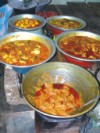 |
Food at small restaurants is often made with used oil which is toxic for the body. (Photo: Tasrif Jafar Siddique) |
While Sumaira has lunch with her children Arafat prefers to eat take-away food and alternates between the handful of restaurants doing brisk business in the middle of the busy Motijheel area. Most of these restaurants are a paradise for all kinds of bacteria including Escherichia coli (E-coli), Salmonella, and Shigella. The Food and Nutrition Department of Dhaka University found the presence of these bacteria in many restaurant food and street food across the city. What is more frightening is that the oil used to fry food at these restaurants are not thrown away after it is used. The oil from the food is stored and reused the following day, which becomes toxic. Many of these restaurants also store raw and cooked food in the same refrigerator.
After lunch Arafat and a colleague pass by a sweetmeat shop and decide to treat themselves to some mouth-watering chomchoms. Although according to the shop display name these scrumptious delicacies are from Porabari but the name is just being used to attract sweet tooths like Arafat and has nothing to do with the famous trademark. Most of these sweetmeats have been made with adulterated ingredients and produced in a filthy environment. The DCC in a recent drive found all the samples of Roshogolla, kalojaam, curd, and sandesh adulterated. Most are made with adulterated dough made from saccharin, flour and toxic colours. Sweetmeat manufacturers also use soybean oil and vegetable oil instead of milk fat. Some sweetmeat makers also use industrial dyes in their products. The dough makers in different parts of the country put sulphuric acid in hot milk to make it thicken quickly.
Professor Golam Mowlah, the Former Director of the Food and Nutrition Department of Dhaka University and the Vice Chancellor of Khulna University thinks that the only way consumers can save themselves from the effects of adulterated food is by being more conscious about this issue.
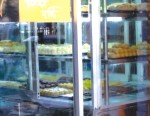 |
Sweet poison. Adulterated dough made with flour, saccharin and toxic colours, are used to make these treats. (Photo: Tasrif Jafar Siddique) |
“When someone goes to buy something from a market they should find out if the quality of that thing is good and whether the weight is correct,” says Mowlah, “food is being adulterated in various ways. Fruits are being ripened with steroids and harmful chemicals. The nutrients from these fruits are lost when these chemicals are added.” Mowlah thinks that it is very important to find out all the details about the food consumers are planning to buy.
“Consumers have a very bad habit of buying things at low price,” says Mowlah. He thinks consumers should focus more on quality and not just buy something because it is cheap. Mowlah believes that it is much safer to eat fruits that are a little old than eat fresh-looking fruits with harmful chemicals. Dishonest traders would stop using harmful chemicals if consumers preferred fruits that did not look attractive.
“Most of the chemicals they use are not food-grade, which is very dangerous for health,” says Mowlah, “and the use of formalin makes food indigestible. If a person continues to eat these formalin-injected food, the body's nerves would be affected and the person could even become paralysed for life.”
Mowlah believes that people's awareness can put a stop to these fraudulent practices. “We all know what a natural fruit or vegetable looks like and we can distinguish it from an artificial-looking one from the way it looks and smells. For example, anyone can understand that the bananas that are available in the market are adulterated. There are laws available but it is ultimately the consumer who has to have the awareness.”
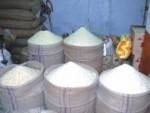 |
The shiny white rice that you so carefully buy has been grown using chemical fertilisers containing urea that is very harmful to humans. (Photo: Tasrif Jafar Siddique) |
Mowlah is very worried about the serious long-term effects on people's health from ingesting so much impure food. “People can have nerve degeneration,” says Mowlah, “and adulteration basically deprives consumers from getting the nutrition they are supposed to get from these foods.” Mowlah thinks that children and pregnant women are most affected by it. “It hampers their [the children's] physical and mental growth, and affects different organs of the body. ”
Emdadul Haque, the Programme Officer of CAB believes that there are not enough laws to protect the consumers from such illegal practice. “The only law that exists at the moment is the Pure Food Act of 1956 which was amended in 2005 and the BSTI Law, both of which can only be enforced by government officials,” says Haque, “under the existing laws the consumer cannot personally file a lawsuit against the company for selling adulterated food.”
Consumers can only place complaints with the Dhaka City Corporation or inform CAB, who arbitrates the issue. “CAB has proposed a set of laws with the government to protect consumers,” says Haque, “and the interim government has promised to enact the Consumer Protection Law in a couple of months.” According to Haque the past governments have been dilly-dallying with enacting this law for some time and if it is enacted consumers can file the complaint without the help of a lawyer.
Copyright
(R) thedailystar.net 2007 |
